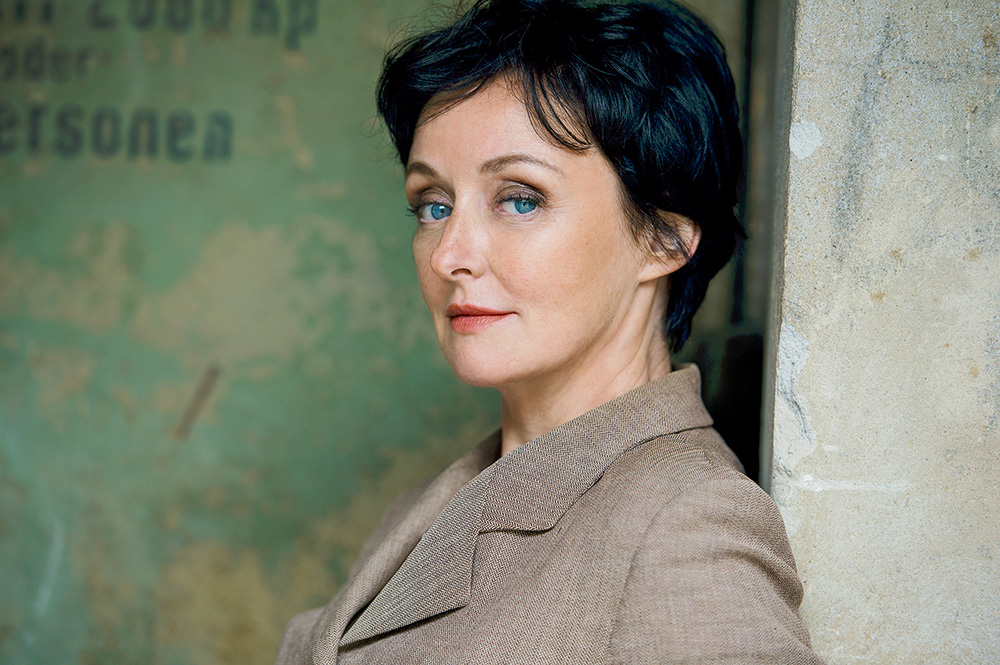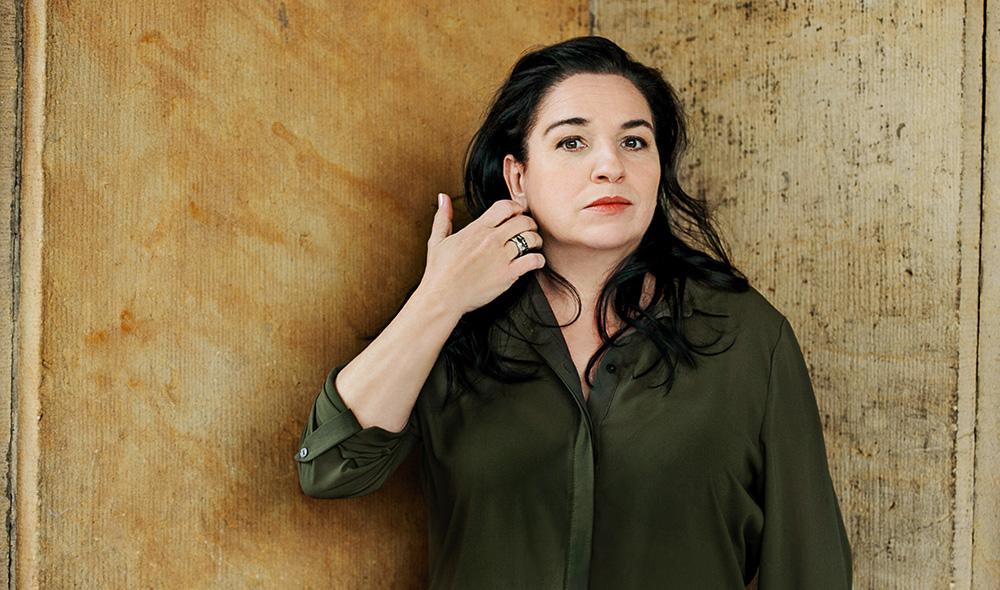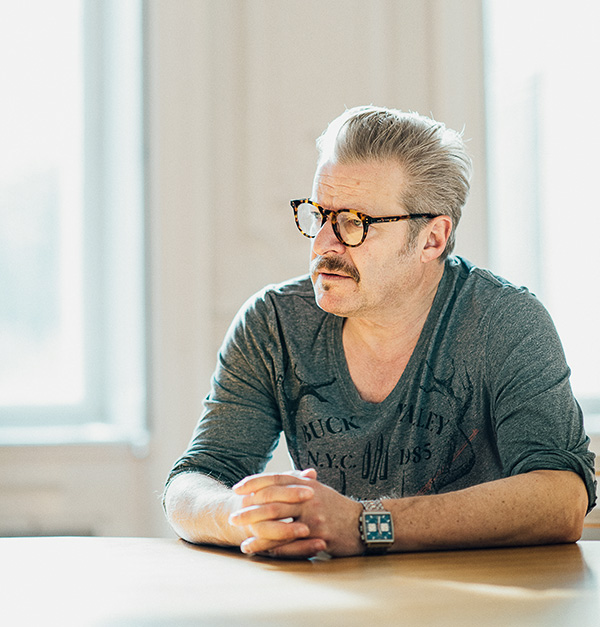Burgtheater actors Regina Fritsch, Maria Happel, and Roland Koch speak about how they teach character development at the Max Reinhardt Seminar.
Both in real life and onstage, it’s often the little things—miniscule details that betray more about oneself than one might like—that make someone who they are. “I like to start with the feet,” says actor Maria Happel, who teaches character development at the Department of Drama – Max Reinhardt Seminar: “The shoes you wear instantly give the character you’re looking to play a certain posture, a certain stance.” So-called Character Development is a core component in the training of young actors. “What you see on paper, printed in black and white, has to become flesh and blood,” explains Roland Koch, who teaches this subject at the Max Reinhardt Seminar along with Happel. The term “character development” goes back to Stanislavski’s pioneering work An Actor’s Work on a Role, which contains detailed descriptions of techniques geared to the gradual embodiment of a character as rehearsal work progresses: these run from role analysis to improvised exercises. According to Stanislavski, the point is to achieve credibility, researching the inner life of the character to be played in order to give rise to a complex portrayal.

Actor Regina Fritsch calls this a “system of psychological coordination.” Students’ work together with her begins at a table, reading the material to be realised and figuring out the characters’ respective traits. What does the text actually mean? What does the play have to do with me, today? Do I understand the language, and what all does it contain? Only in a second step does work shift onstage to search for a concrete embodiment, to construct an appropriate situation for the scene, and to try out answers to questions that were initially arrived at sitting at the table. Such as: How does the character move? Do they have any particular quirks? How complex is their reaction to their current predicament? “You feel your way forward with imagination and thoroughness until you’ve internalised the character,” asserts Fritsch. What differs from one’s subsequent work at an actual theatre is really just the university’s character as a safe space of sorts. “Most directors give you zero time; what they all want is to see everything in different versions right away,” says Fritsch, who speaks from experience. Which is why, particularly in the beginning, it’s important to help students develop a certain assurance.

Roland Koch’s take on this is even broader: “It’s about a fundamental discourse on our profession, which has, after all, changed quite a bit in recent years.” Contract periods at theatres are getting shorter while the pressure felt by young actors is increasing. “The question is: for just what market are we actually training people?” Koch’s desire is to train not yes-men and -women, but curious actors. Actors who ask themselves just what they want to do after graduation. “30 years ago, when I started out, there was a clear social contract and a full complement of cultural offerings. You knew that while you might start out in the provinces, you’d end up at a bigger venue sooner or later,” the Burgtheater actor remembers: “Today, the career carousel moves in fits and starts, with less and less positions for more and more actors.” Koch thus feels that it’s important to conquer new territory—which by no means includes just film and television work. Should I, as a one-person enterprise, become a soloist with a literary programme and take it on tour? Should I maybe try out the off-scene? Or perhaps even author my own plays?
Though there’s a lot of talk about performers taking the place of classic psychologically trained actors, Fritsch, Happel, and Koch concur that most of their students still want to take on authors like Chekhov in order to explore their characters from the inside out. “Performing in and of itself isn’t hard,” says Fritsch, adding provocatively: “Even my cat can do that. But performing exhausts itself pretty fast, while psychological acting is enormously multifaceted.” Happel likewise thinks that the Max Reinhardt Seminar should produce graduates who are prepared as thoroughly as possible for on-the-job reality, where projects characterised by radically personal directorial handwriting are just as common as those under directors who work in a very open way. “Our profession has something to do with magic,” she says. “The older actors have to whisper the secrets, the tricks learned through experience, in their younger colleagues’ ears—like in a generational relay where things get handed off from old to young.” For Happel, it’s about “making yourself available as a vehicle for a character you’ve developed for yourself.” And in doing so, the question of just what a text and a character have to do with one’s own self is of central importance.

Teachers are usually one’s first critics in a profession whose practitioners have to be able to take a lot. How do you deal with getting ripped to shreds by newspaper critics? “Whoever claims that criticism doesn’t hurt is lying,” says Fritsch point-blank: “And nobody needs careless feedback; constructive suggestions for improvement are far more important.” Fritsch also feels that times have definitely gotten harder: back when she began working in theatre, there still existed something like a theatrical family, where older mentors took younger colleagues under their wings. But with permanent ensembles shrinking, the battle for gigs has become more brutal. So conversations with young actors need to address this, as well, preparing young actors to deal with perhaps not getting hired straight off. “We also talk about a lot of the current debates, from #MeToo to the question of actors’ place in the creative process,” says Koch: “About whether actors aren’t in fact also dramaturges, directors, and authors.” Because theatre, as a projection of reality, has to face reality’s urgent themes. This also includes knowing what’s currently happening on the various stages: “I hound my students to go and see every production,” says Koch, who freely admits not knowing the answer to every question. But the questions themselves, he emphasises, are of enormous importance in theatre—while answers are often overestimated. Or as the great Irish dramatist Samuel Beckett once put it: “Try again. Fail again. Fail better.”

